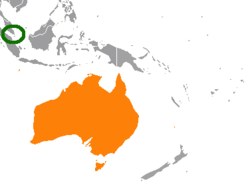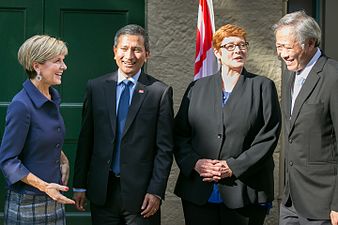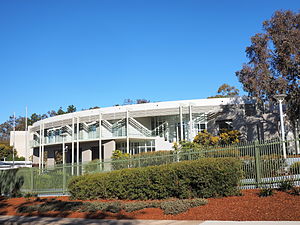
Singapore maintains diplomatic relations with 189 UN member states. The three exceptions are the Central African Republic, Monaco and South Sudan.
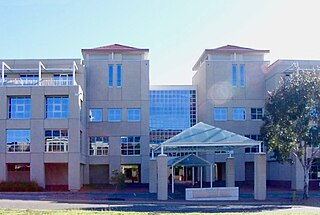
Foreign relations of Australia are influenced by its position as a leading trading nation and as a significant donor of humanitarian aid. Australia's foreign policy is guided by a commitment to multilateralism and regionalism, as well as to build strong bilateral relations with its allies. Key concerns include free trade, terrorism, refugees, economic co-operation with Asia and stability in the Indo-Pacific. Australia is active in the United Nations and the Commonwealth of Nations. Given its history of starting and supporting important regional and global initiatives, it has been described as a regional middle power par excellence.

Under the Basic Law, Macau's diplomatic relations and defence are the responsibility of the central government of China. Except diplomatic relations and defence, nonetheless, Macau has retained considerable autonomy in all aspects, including economic and commercial relations, customs control.

The Singapore–United States relations refers to the bilateral relations between the Republic of Singapore and the United States of America. According to the U.S. Global Leadership Report, 77% of Singaporeans approved of U.S. leadership under the Obama Administration in 2010, and while this approval rating decreased slightly down to 75% in 2011, it nonetheless remains one of the highest ratings of the U.S. for any surveyed country in the Asia-Pacific region.

Russia–Singapore relations are the bilateral foreign relations between the two countries, Russia and Singapore. Russia has an embassy in Singapore. Singapore has an embassy in Moscow. Both countries are full members of APEC. Relations between the 2 countries have been friendly since bilateral ties were established. Due to the 2022 Russian invasion of Ukraine, relations became very tense after Singapore imposed sanctions against Russia. Russia placed Singapore on a list of "unfriendly countries" along with Taiwan, Japan, South Korea, the United States, European Union members, NATO members, Canada, Australia, New Zealand, Norway, Switzerland, Micronesia and Ukraine.

India-Singapore relations, also known as Indian-Singaporean relations or Indo-Singaporeanrelations, are the bilateral relations between India and Singapore. Relations between the two countries have traditionally been strong and friendly, with the two nations enjoying extensive cultural and commercial relations. India and Singapore have signed the Comprehensive Economic Cooperation Agreement (CECA) and strategic-relationship agreement in order to increase trade, investments and economic cooperation, and expanded bilateral cooperation on maritime security, training forces, joint naval exercises, developing military technology and fighting terrorism.
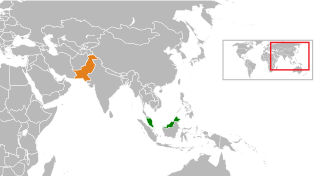
Malaysia–Pakistan relations refer to bilateral foreign relations between the two countries, Malaysia and Pakistan. Pakistan has its high commission (embassy) in Kuala Lumpur, and Malaysia has its high commission in Islamabad. Both countries are members of the Commonwealth of Nations and the Organisation of Islamic Cooperation.

Malaysia–New Zealand relations refers to foreign relations between Malaysia and New Zealand. Malaysia has a High Commission in Wellington, and New Zealand has a High Commission in Kuala Lumpur. Both countries are full members of the Commonwealth of Nations and Malaysia is important to New Zealand for strategic, political and economic reasons, with both countries' leaders were engaged in frequent visits to boost their relations.

Foreign relations exists between Australia and Malaysia. Australia has a high commission in Kuala Lumpur, and Malaysia has a high commission in Canberra. Both Australia and Malaysia are members of the Five Power Defence Arrangements and often participate in military exercises together.

Singapore–United Kingdom relations, also referred to as British–Singaporean relations, are the relations between the states of Singapore and the United Kingdom. Both countries are full members of the Commonwealth of Nations and are marked by historical, cultural, institutional and language ties, extensive people-to-people links, aligned security interests, sporting tournaments, and significant trade and investment co-operation.

Pakistan–Singapore relations refer to bilateral relations between Pakistan and Singapore. Singapore has its High Commission in New Delhi, India for its official accreditation while also maintaining a consulate general in Karachi, Pakistan, and Pakistan has a High Commission in Singapore. Both countries are members of the Commonwealth of Nations.

Canada–Singapore relations refers to the current and historical relations between Canada and the Republic of Singapore. Both nations are members of the Asia-Pacific Economic Cooperation, Commonwealth of Nations and the United Nations.
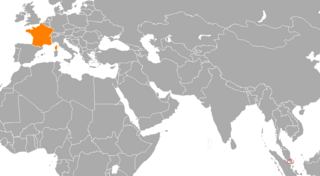
France–Singapore relations refers to the bilateral relations between the French Republic and the Republic of Singapore.

Singapore - Turkey relations are the bilateral relations between Singapore and Turkey. Diplomatic relations between the two countries were established on 12 February 1969. Singapore has an embassy in Ankara. Turkey has an embassy in Singapore.

Angola–India relations refers to the international relations that exist between Angola and India.
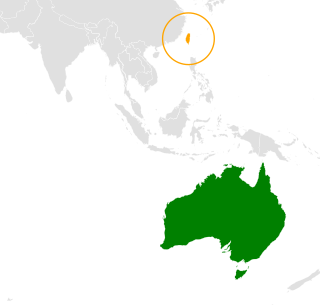
Relations between the Commonwealth of Australia and the Republic of China, formerly the Qing dynasty, date back to 1909. Since 1972, the political status and legal status of Taiwan have been contentious issues. Australia and Taiwan share partnership in the inter-governmental Global Cooperation and Training Framework (GCTF) activities.

The most significant initiative made by the Narendra Modi government is the focus on neighbouring countries and major Asian powers coupled with emphasizing on the two decades old Look East policy. Asia being the major focus area of his foreign policy, Modi and his foreign minister chose several Asian countries for their initial bilateral visits. He has made state visits to Bhutan and Nepal and Japan within the first 100 days of his government and also hosted Asian leaders like former Prime Minister Tony Abbott of Australia, President Xi Jinping of China and Prime Minister Nguyễn Tấn Dũng of Vietnam, apart from inviting SAARC leaders in his inauguration ceremony. External Affairs Minister Sushma Swaraj has also made official visits to several Asian capitals like Dhaka, Bangladesh, Kathmandu, Nepal, Naypidaw, Myanmar, Singapore, Hanoi, Vietnam, Manama, Bahrain, Kabul, Afghanistan, Dushanbe, Tajikistan, Malé, Maldives, Abu Dhabi, United Arab Emirates, Seoul, South Korea and Beijing China.

The Republic of Singapore and the Republic of South Africa are independent countries which have achieved independence from Great Britain and currently maintain friendly bilateral relations. The connections between the two countries are based primarily on their membership in the Commonwealth of Nations, and their interactions in international trade and tourism. Both countries also cooperate in social and economic development issues.

Diplomatic relations between Australia and Morocco were established in 1976. Morocco has had an embassy in Canberra since 2004 and the Australian Embassy in Rabat was established in May 2017, upgrading the existing Austrade office in Rabat. Previously the Australian Embassy in Paris was accredited to Morocco since 1978.

Bilateral relations between the Republic of Singapore and the Kingdom of Thailand formally date to 1965, when Thailand established diplomatic relations soon after the independence of Singapore. Both countries are the founding members of the Association of Southeast Asian Nations.
